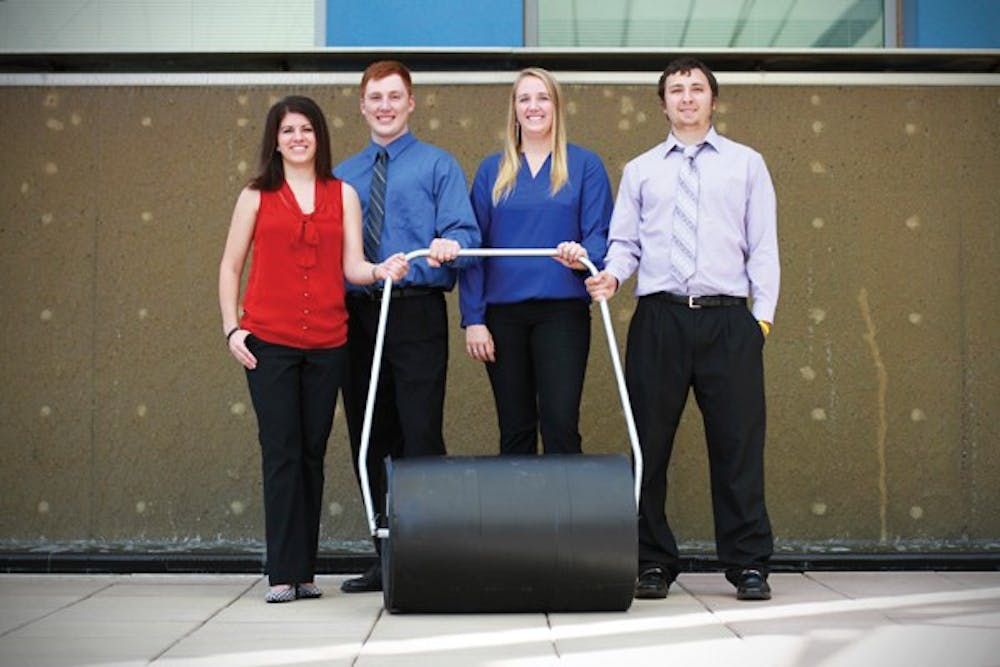 Lindsay Fleming, Jared Schoepf, Taylor Barker and Jacob Arredondo stand with their SafeSIPP unit outside of Skysong on Sept. 28. SafeSIPP is a water filtering system that allows users in underdeveloped countries to transport water easier while purifying it simultaneously. (Photo by Sam Rosenbaum)
Lindsay Fleming, Jared Schoepf, Taylor Barker and Jacob Arredondo stand with their SafeSIPP unit outside of Skysong on Sept. 28. SafeSIPP is a water filtering system that allows users in underdeveloped countries to transport water easier while purifying it simultaneously. (Photo by Sam Rosenbaum)Every day, people in developing communities have to walk long distances to reach a contaminated water source, which is why four ASU students said they developed a round filtration device that purifies water as it is rolled.
Chemical engineering seniors Lindsay Fleming, Taylor Barker and Jared Schoepf and marketing senior Jacob Arredondo teamed up to start their business, Safe Sustainable Innovative Portable Purification, about a year ago.
“I’m hoping to reduce the amount of suffering and deaths,” Fleming said.
The goal of their more-than-profit business goes beyond selling the product. They said they want to help solve the social and health problems people in these areas are facing.
People in third world countries can sell donated items, like mosquito nets, to make a short-term profit. SafeSIPP wants to prevent consumers from selling its product’s parts by placing a price on the system.
“They value it more if they pay for it,” Barker said.
Their product is a 30-gallon barrel with a three-step purification system and a handle attached to facilitate transportation.
Fleming said they are the first to develop a product that not only helps transport water, but also purifies it along the way.
After learning of the problems associated with the lack of purified water in the developing countries, Fleming recruited Barker, Schoepf and Arredondo to develop a solution.
They received their initial funding through Engineering Projects in Community Service to begin the construction of a prototype.
Although the group was not sure how much funding they had received initially, they estimated between $1,500 and $2,500.
From then on, they worked closely with the Edson Student Entrepreneur Initiative.
The initiative provides a selected group of student entrepreneurs with funds and mentoring each year.
“We would not be here without them,” Fleming said.
SafeSIPP’s creators are looking beyond purifying water and have developed a micro-financing platform for the communities to use.
“We want to bring up the economy in the villages,” Schoepf said.
This fall, Fleming will travel to Bergnek, South Africa to begin making connections with the community.
Fleming said they must first educate communities on the importance of clean water for the micro-financing platform to be effective.
SafeSIPP, working alongside nonprofit organizations, will teach the communities the necessary business skills they need in order to make a profit selling the purified water, Fleming said.
Schoepf said the end goal of the micro-financing platform is for the people of these communities to make a profit and to better use the time previously spent on countless trips to and from their water source.
The team said they are still fine-tuning the production side.
The cost of the device is not yet set, but it costs about $100, which they said is similar to devices already on the market that help with transportation but do not purify.
They said they hope to gain the knowledge needed to begin producing and selling their product following Fleming’s trip to South Africa.
Arredondo said he hopes to be in mass production within the next two years.
Reach the reporter at jaborbon@asu.edu




